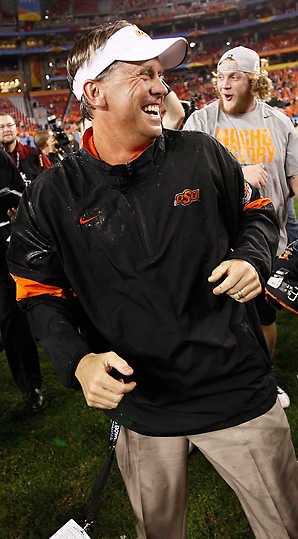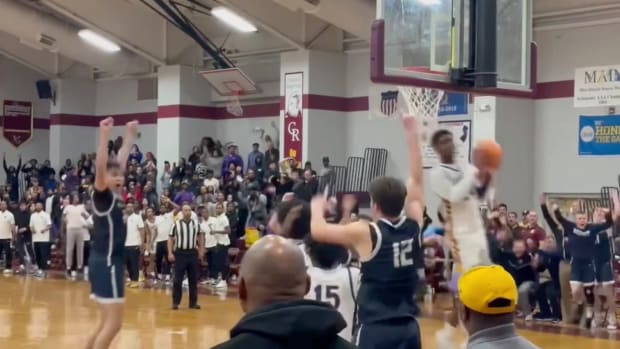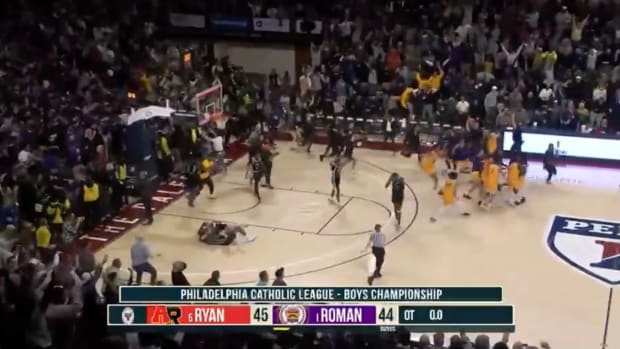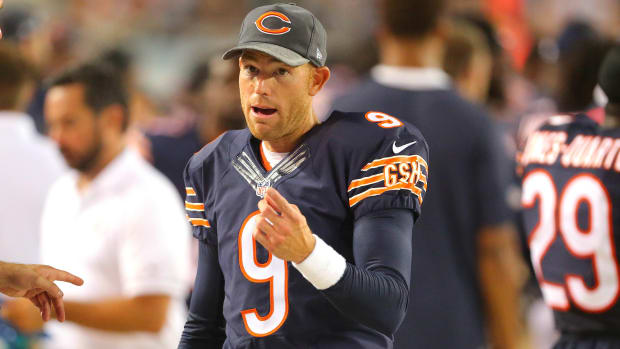Position coaches, not head honchos, are now the ace recruiters

Todd Monken was the lead recruiter for Oklahoma State commit Luke Del Rio. Once Monken left to go coach Southern Mississippi, Del Rio decommitted.
Matt York/AP
When Oklahoma State lost its offensive coordinator, it also lost a quarterback. Mike Gundy's offense is still going to be in Stillwater next year, but Luke Del Rio is not.
These things happen. Del Rio, a three-star quarterback at Denver (Colo.) Valor Christian, decided to break his longstanding commitment to the Cowboys shortly after offensive coordinator Todd Monken accepted the head coaching job at Southern Miss.
"I had a great relationship with Coach Monken," Del Rio said. "When he left, it was a big part of why I decided to de-commit, but it wasn't everything. With him leaving, I knew I had to see my other options."
Del Rio's case is not unique. Not in 2012. USC defensive tackle commit Eddie Vanderdoes is taking visits and establishing backup options. He's not worried about the future of Lane Kiffin at USC or because the Trojans struggled to a 7-5 season. Vanderdoes does want a safety net in the event that defensive coordinator Ed Orgeron decides to seek out a new job.
Ask four-star offensive tackle and current UCLA commit Kenny Lacy what would happen if Bruins offensive line coach Adrian Klemm were to part ways with the program, and he doesn't mince words.
"I'd seriously look around," Lacy said. "My position coach is much more important than my head coach. He's the guy I have to be around on a daily basis and have a strong relationship with."
It's the same line of thinking for uncommitted prospects. Discussing a newly hired head coach's recruiting background is fashionable. It's done in every instance at every school in the country. That's not going to change. How much it actually matters, on the other hand, already has.
Five-star running back Derrick Green is the fifth-ranked uncommitted player in the country and the No. 14 prospect overall. What's he looking for in a college? First, a place where he can collect wins. Secondly, a strong relationship with the man who overseas his position group.
The guy sitting in the big office and calling the shots is secondary at best. And so goes the evolution of modern recruiting.
"I think the position coach is going to matter more to me because I'm going to spend 95-percent of my time with my position coach," Green said.
Of course it's not a cardinal rule; players are different and it's impossible to predict what a high school prospect wants. Still, the days of the head coach being the highest authority on the recruiting trail are waning.
In a survey of top-level players that attended this summer's Rivals100 Five-Star Challenge, 79 percent of the participating group said their potential position coach was more important than the head coach when it comes to evaluating a school.
And that number seems to be trending upward.
"With the bylaws that are in place, the head coach is kind of prevented from getting out and recruiting," said Stanford offensive coordinator Pep Hamilton. "It puts more on us assistant coaches to build these relationships. The head coach is really just the closer now."
They make the call on the offer, but when it comes to a player accepting it, they're on the receiving end. And rarely are they the first to know.
"Our protocol is to put any kid who commits on the phone with the head coach so they can have more of a official sense to it," Hamilton said.
Of course there are the transcendent names. A conversation with Bob Stoops is still capable of making an impact on a high school football star. As is a meeting with Nick Saban. Almost everyone else's success, on the other hand, hinges on surrounding themselves with the right people.
"When I told Coach Gundy that I was de-committing he was very understanding of why, but he reiterated how much he wants me to go there," Del Rio said. "He's said he was still going to recruit me."
The problem is that forging a new bond in the two months until signing day might be impossible.




